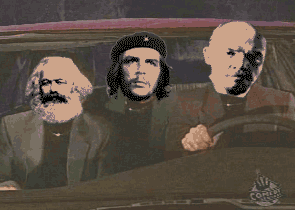Ah, ok.
Well, in my text, I begun explaining how much variation the term "communism" has faced, and specifically used a methodological cut to define that I was using Marxism. The sentence you highlight, after all, ends with "
when the term 'communism' is linked to Karl Marx's writings".
That said, look at the terms you set to bring about your contemption - specifically the item 2:
2) The set of policies designed to transform a dying capitalist economy into the socialist phase (...)
That's my point, right there. What is a "dying capitalist state" for Marx? One in which , after the success of the phase of enrichment has emancipated the workers, they acknowledge their insurmountable class power.
Does it look like what happened in the USSR, or China, or Cuba, or the Eastern Europe? I see no worldly examples that follow the recipe written by Marx, not of execution of the model, but of
inception of the model. These were poor, backwards economies. Old Russia was nearly feudal. There was no enrichment nor enlightment of any kind.
To be absolutely precise, I think - again, as it would derive from my indicated post - that by diagnosing the class struggle, Marx ironically advised the rich societies (ergo, those able to follow his steps to the letter) on how to minimize their internal degrees of discontent from the lower classes, minimizing the risks of the class showdown he thought inevitable (and history so far has proven all fatalists to be wrong). This is what the social-democratic modern states are all about.
So there never were a society, in the world, "mature" to try communism. The rich ones managed to subdue general discontent to sustainable levels by some wealthy redistribution (pay raises, union advancements, public healthy and education, etc...); the poor ones, that had no resources for that distribution, were either oppressed by internal and external forces (dictatorships in Africa and South America), or indeed did turn communist artificially, by the grace of the discourse of small politically organized entities with Marxist jargon, not by a natural and generalized consensus that Marx, again, thought inevitable.
When the instructions are disregarded before an experiment begin, could one really say that the experiment was even tried? I'd argue that the answer is no - therefore,
the first step was never taken.
Apparently we don't disagree that the third step was missed (transition from socialism to communism), so I didn't venture there.
Of course, if you dissociate from Marx' pure writings, if you deny the methodological cut I proposed, you can negate all my argument, because, as I said, no one has authority to determine the limits of a conceptual idea, that is without real physical world phenomena to help us find it's delimitation. But IMHO, the cut I proposed is legitimate because Marx is the figurehead thought of every time people talk about these concepts.
Regards

.
 .
.

